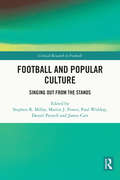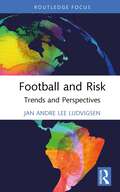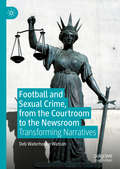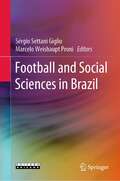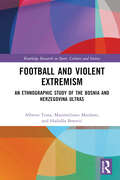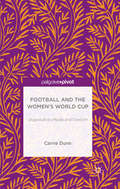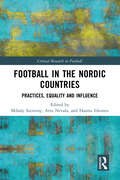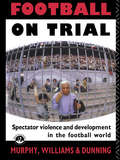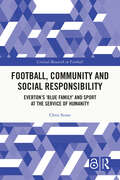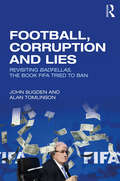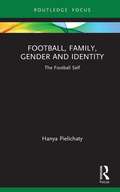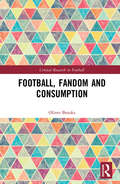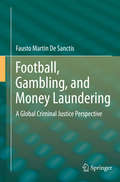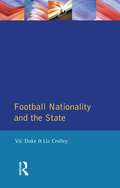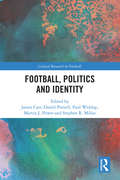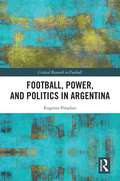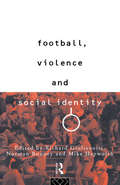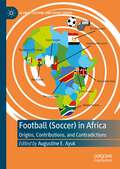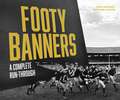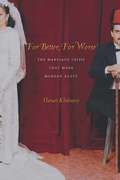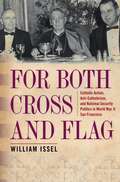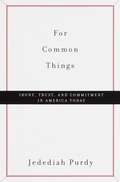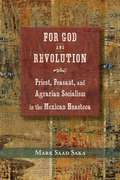- Table View
- List View
Football and Popular Culture: Singing Out from the Stands (Critical Research in Football)
by James Carr Paul Widdop Martin J. Power Daniel Parnell Stephen R. MillarFootball is ubiquitous and a permanent fixture of modern life. More than a sport, it frequently manifests in broader popular culture. This book examines the significance of football for, and in, popular culture across a wide range of forms, including music, film, and social media. Football and Popular Culture plots a new path in Football Studies, drawing on original research in countries including England, Brazil, Germany, Canada, and Yugoslavia. The book includes both historical and contemporary perspectives, exploring some of the most important themes in the study of sport and culture, including identity, nationalism, fandom, and protest. It presents diverse case studies ranging from sonic violence among Brazilian torcidas organizadas to fanled commemoration of the Munich air disaster, which together help us to better understand the intersection of sport, society, and popular culture. This is fascinating reading for any student or researcher working in sport studies, cultural studies, media studies, sociology, or contemporary history.
Football and Risk: Trends and Perspectives (Critical Research in Football)
by Jan Andre LudvigsenThis is the first book to look closely at the concept of ‘risk’ in elite and professional football from a social scientific perspective. Drawing on the wider sociological, criminological and management literature on risk, it shows how football helps us to understand global risk more generally in present-day society. The book explores how attitudes to risk have shaped modern football business, and identifies those risks that pose a threat to the sustainability of football in the future. It draws upon the work of theorists including Ulrich Beck, Anthony Giddens and Michel Foucault, as well as digital media sources and policy documents, and covers a range of topics, cases and themes including political, environmental and terrorism risks, technologies, the governance of fans, and risk resistance. In the context of the social, globalised and commercialised realm of football, as well as a global pandemic that has had a profound influence on attitudes to risk, the book argues that modern societies’ preoccupation with risk has transformed the ways in which modern football is played on the pitch, organized off the pitch, covered in the media, and attended by fans. Including an extended case study of the 2026 World Cup, to be held in the USA, Mexico and Canada, this is a thought-provoking read for any student, researcher or policy-maker with an interest in football, sport, events, sociology, criminology, or risk management.
Football and Sexual Crime, from the Courtroom to the Newsroom: Transforming Narratives
by Deb Waterhouse-WatsonThis book interrogates the process of court reporting on rape and other sexual crime cases involving Australian footballers. At the intersection of sport, gender, media and the law, it uncovers the story behind rape myths and stereotypes in media. This book analyses newspaper reporting alongside transcripts of the trials they represent and interviews with the journalists themselves. Waterhouse-Watson’s work maps structural factors within newsrooms, and the complex relationship between the judiciary and media, that affect the practice of court reporting. This book approaches key journalism concepts like objectivity and balance critically, illustrating the layers of mediation that surround a complainant’s testimony; the way sport shapes the meaning of courtroom and media narratives in these cases; and the tension between racism and sexism when race is thematised or otherwise highlighted. Ultimately, the book proposes an ethics of court reporting that protects individual complainants, as well as advancing public understandings of the crime.
Football and Social Sciences in Brazil
by Sérgio Settani Giglio Marcelo Weishaupt ProniThis book presents a kaleidoscopic view of the multidisciplinary field of research developed within Brazilian social sciences to study football as a major cultural and social phenomenon in the country. As a contributed volume, it brings together chapters authored by researchers from different disciplines, such as sociology, anthropology, political science, history, geography, economy, communication studies and physical education, who contributed to make Brazilian football a multifaceted object of study for the human and social sciences. The book is divided in four parts. The first two parts are dedicated to the "classic" areas, in which the best known research lines are concentrated: part one focuses on politics and history, while part two is dedicated to sociology and anthropology. The third part brings together studies from other four different areas: communication studies, geography, economy and physical education. The fourth part is organized not by disciplines, but around transversal themes, such as gender, violence, fans and racism. The varied approaches and different interpretations brought together in this book seek to provide an overview of the fertile academic debate that has stimulated the renewal of scientific research on football in Brazil, which makes Football and Social Sciences in Brazil a useful resource for researchers from different disciplines within the human and social sciences interested in the study of football as major cultural and social phenomenon all over the world.
Football and Violent Extremism: An Ethnographic Study of the Bosnia and Herzegovina Ultras (Routledge Research in Sport, Culture and Society)
by Alberto Testa Massimiliano Maidano Hadidža BorovićThis book examines the ways that nationalist leaders and extremist groups have used football to advance their often-violent ideological narratives and to recruit and radicalise young people.Drawing on applied ethnographic research with the Ultra fan groups of Bosnia and Herzegovina (BiH), the book explores the behavioural dynamics of the BiH Ultras both on, and outside of, the football terraces. The book shines important new light on the Ultras' ideology, organisation and youth recruiting strategies, and their connections with other extremist groups. In a country and region divided on ethnic and religious lines, in which far-right and ethno-nationalist groups are a visible presence in politics and society, this book helps us to better understand why, when, and how BiH youth choose to join these groups, and why, when, and how these groups participate in violent acts, hate speech, crime, and racist actions. The book has important implications for efforts to counter violent extremism across the Western Balkans and beyond.This is valuable reading for any researcher, advanced student, policy maker, or practitioner working in sport studies, political science, criminology, development studies, security studies, or post-conflict studies.
Football and the Women's World Cup: Organisation, Media and Fandom
by Carrie DunnWomen's football is the fastest growing participation sport in both the UK and across the world, and the 2015 Women's World Cup was the biggest tournament the sport had ever seen. This book explores the experience of fans of women's football who followed their teams in Canada, examining their practices and fan behaviour. How did host cities manage the influx of visitors? And how did fans manage to support their teams, considering the vast amounts of travel expected across such a big country? Dunn also examines the way that the England team is structured and run, relating this to the country's domestic competition, as well as assessing the media coverage of women's football globally. This research is all framed within the author's own experiences of the Women's World Cup, as both an academic and as a sports journalist.
Football in the Nordic Countries: Practices, Equality and Influence (Critical Research in Football)
by Mihaly Szerovay Arto Nevala Hannu ItkonenThis book explores football culture, organisation and development in the five Nordic countries: Denmark, Finland, Iceland, Sweden and Norway. These countries represent an important case study in sport culture, policy and management, being shaped by unique traditions in their civil society and in social welfare and public policy. The first part of the book explores the development path of football in each country, looking at how football arrived in Scandinavia and how it has been transformed from a voluntary civic activity into a professional sport while becoming closely attached to the global football system. The second part highlights key issues – including historical, contemporary and critical aspects – across three themes: professionalisation and changing practices; equality and gender; and supporters, audiences and culture. Written by a team of authors with a blend of experience as academics and practitioners in football, the book traces the contours of the distinctive Nordic model that occupies a prominent position in the global football system. Shining fascinating new light on the relationship between football and wider society, this is invaluable reading for students and researchers interested in football, sport management, sport policy, or the history, culture or sociology of sport and for anyone involved in the game.
Football on Trial: Spectator Violence and Development in the Football World
by John Williams Eric Dunning Patrick Murphy Patrick J MurphyFirst Published in 2004. Routledge is an imprint of Taylor & Francis, an informa company.
Football, Community and Social Responsibility: Everton’s ‘Blue Family’ and Sport at the Service of Humanity (Critical Research in Football)
by Chris StoneThis book shines a light on the value and effectiveness of football clubs’ community engagement work, the cultural value of sport and the position sport plays within people’s daily lives.The book considers the deep historical roots that many football clubs have as charitable institutions within their civic locales. Including original research carried out during the COVID-19 pandemic, the book presents an in-depth case study of Everton FC and their associated charitable trust. It takes a close look at the outreach work that they undertook during the pandemic to support vulnerable people in the local community and considers the value of that work more generally for local residents, football fans, club staff and other stakeholders. The book also places the Everton case study in the context of wider debates around the use of sport in the service of humanity, and corporate social responsibility in the sport industry.This is fascinating reading for any student, researcher, policy maker, practitioner or football fan with an interest in sport (for) development, community work, the relationship between sport consumption and wider society, ethical business or the English Premier League.
Football, Corruption and Lies: Revisiting 'Badfellas', the book FIFA tried to ban
by Alan Tomlinson John SugdenWorld football is in crisis. The corruption scandal engulfing FIFA is arguably the biggest story in the history of modern sport and a watershed for sport governance. More than a decade ago, John Sugden and Alan Tomlinson laid the foundations for subsequent investigations with the publication of Badfellas, a groundbreaking work of critical sport sociology that exposed the systematic corruption at the heart of world football. It was a book that FIFA and Sepp Blatter tried to ban. Now re-issued to combine the original contents of Badfellas with new chapters covering the current crisis, this book points to the ways in which FIFA’s new administration can learn from the Blatter story. The prequel traces the course of Sugden and Tomlinson’s game-changing investigation into FIFA, while the sequel updates the FIFA story from 2002 onwards and provides a chronology of crises and scandals within the FIFA narrative. Demonstrating the vital importance of critical investigative methods in sport studies, Football, Corruption and Lies: Revisiting Badfellas, the book FIFA tried to ban is essential reading for anybody looking to understand Blatter’s rise and fall.
Football, Family, Gender and Identity: The Football Self (Critical Research in Football)
by Hanya PielichatyThis book presents a cross-disciplinary examination of the lived experiences of girls and women football players using theoretical insights from sports studies, psychology, sociology and gender studies. It examines the concept of ‘the football self’ – your own, personal football identity that encapsulates the importance of football to our everyday lives – and what that can tell us about the complex relationships between sport, family, gender and identity. The book draws on in-depth ethnographic research involving players and family members, and offers important new insights into the everyday experiences of those girls and women who play. It breaks new ground in focusing on the significant relationships between player and family with a particular focus on parenting through football. The book brings to the fore key debates around gender identity, barriers to participation, cultural gaps and discrimination. The author also brings a personal perspective to bear, drawing on experience gained over 20 years as a player, adding an extra critical layer to her important empirical research. This is essential reading for all researchers and students with an interest in football, sport studies or issues around gender, inclusion or the family in sport, and fascinating reading for anybody generally curious about football.
Football, Fandom and Collective Memory: Global Perspectives (Critical Research in Football)
by Przemysław Nosal, Radosław Kossakowski and Wojciech WoźniakThis book examines the topic of identity and collective memory in football fandom. Drawing on global research in history, sociology and political science, the book looks at how, where and why football fans and supporters’ groups introduce particular role models into their self-identity and performative narratives.The book presents original, cutting-edge research that illustrates the complex, multidimensional nature of the (re-)formulation of collective memory and the elevation of role models. It looks at the processes by which some supporters’ groups celebrate historical and contemporary figures – including political leaders, warriors, revolutionaries, or armed resistance groups – that they believe embody patriotic, regional or nationalist virtues, as well as supporters’ groups who define their patriotism in opposition to these figures. The book presents cases ranging from Ukrainian football ultras in the shadow of Russian aggression, and Jewish role models in Germany’s collective football memory, to the symbology of Che Guevara and Diego Maradona in Brazilian and Argentinian football, to hero formation and the myths of national identity in Australian football.This is fascinating reading for anybody with an interest in the sociology, culture or politics of sport, or in fandom, identity, nationalism more broadly in sociology, political science or history.
Football, Fandom and Consumption (Critical Research in Football)
by Oliver BrooksModern football is an industry and capitalism is its engine. However, this book argues for a more nuanced understanding of contemporary football culture and the (self-)identity of football fans. Drawing on original ethnographic research conducted with fans at all levels, from international to lower league, the book explores the tensions between fans as consumers and ‘traditional’ football cultures, arguing that modern football fans are able to negotiate the discourses of capitalism and tradition operating upon them to enact their own power and identity within football culture. Featuring case studies of Norwich City, MK Dons and Chelsea fans, this is fascinating reading for anybody with an interest in sport and society or cultural studies.
Football, Gambling, and Money Laundering
by Fausto Martin De SanctisProfessional football means many things to many people. For players, a means to possible fame and fortune. For fans, a source of local or national pride, and perhaps the chance to score with a few bets. For criminal organizations, a cover for making millions in corrupt enterprises. In the world of gambling this is no different. Football, Gambling, and Money Laundering describes in impressive detail the scope of the problem, the layers of denial that allow sports-related financial crime to flourish, and the steps that are being taken--and that need to be taken--to combat illicit operations in the sports world. Expert analysis explains criminal activity in the context of football, and how sports governing bodies, the media, and others have created a culture that regularly turns a blind eye. International data and instructive legal case examples shed light on the role of the Internet in the spread of gambling and money laundering as well as the strengths and weaknesses of current law enforcement, legislative, and sports-based efforts in fighting corruption. Included in the coverage: * Criminal activity in the sports world * Financial crime and exploitation in football and gambling * Legal wagering and illegal betting, including online * Illegal and disguised payment instruments used by organized crime * International legal cooperation in combating money laundering * National and international proposals for improving the sports and gambling industries to prevent money laundering An authoritative reference to a growing and wide-reaching concern, Football, Gambling,and Money Laundering will find an interested audience among academics, prosecutors, judges, law enforcement officials, and others involved in efforts to curb corruption and money laundering in the world of football.
Football, Nationality and the State
by Vic Duke Liz CrolleyFootball, Nationality and the State examines the complex and ever-changing relationship between football (its development and structure), nationality and the state. Divided into two parts the book first deals with the existence of more than one football nation within the same political state. Using international comparisons the authors argue that these divisions may result from football's early history and development, regional movements for independence, or the growth of a language cleavage. The second part of the book goes on to examine the structure of football as an extension, or reflection, of the structure of the state. Resulting structures include the imposition of state socialism on sport, the presence of democratic politics in the organisation of football clubs and the links between big business and football.
Football, Politics and Identity (Critical Research in Football)
by James Carr; Daniel Parnell; Paul Widdop; Martin J. Power; Stephen R. MillarThis book presents a series of fascinating case studies that show how the lives and bodies of clubs, players and fans around the world are enmeshed with politics. It draws on original research in countries including England, Scotland, Ireland, Poland, Mexico, Algeria and Argentina and includes both historical and contemporary perspectives. It explores some of the most important themes in the study of sport, including sectarianism, migration, fan activism and national identity, and shows how football continues to be tied to political events, symbols and movements. This is fascinating reading for any student or researcher working in sport studies, political science, sociology or contemporary history.
Football, Power, and Politics in Argentina (Critical Research in Football)
by Eugenio ParadisoThis book examines the interplay between football, politics, violence, passion, and morality in Argentina. Drawing on original ethnographic research, it considers the role of fans, club officials, politicians, and others in the spread and perpetuation of corruption and violence within football and in wider Argentinian society.Argentina’s triumph in the 2022 World Cup brought millions onto the streets of Buenos Aires in celebration, but this book argues that beneath the veneer of sporting success lie networks of power and practices that have naturalized corruption and violence within Argentinian football and, by extension, in Argentinian society as a whole. It shows how the actions of club officials, politicians, barras (groups of organized, violent fans), and the police, which together represent a system of clientelism, exemplify in the world of football the system of organized chaos that habitually defines Argentinian politics. With the barras given licence to engage in violent behaviours linked not only to sporting passion but also to economic and political interests, this book argues that football, politics, and violence have become entangled in a web of social relations that illustrate Argentina’s struggle to break the vicious cycle of corruption and impunity.Shining new light on the significance of sport in wider society and the centrality of football in one of the world’s greatest footballing nations, this book is essential reading for anybody with an interest in the anthropology, sociology, politics, or history of sport, or in political science, corruption, or Latin American studies.
Football, Violence and Social Identity
by Richard Giulianotti Mike Hepworth Norman BonneyDrawing on research from Britain, Europe, Argentina and the USA this volume examines the culture and loyalties of soccer players and crowds and their relationships to social order, disorder and violence. This informative and accessible book will be of interest to students of Sport Science and to all of those who love the game of soccer.
Football: Origins, Contributions, and Contradictions (Global Culture and Sport Series)
by Augustine E. AyukThis volume provides an analysis of the history, origins, and development of football in Africa. It brings together an edited assemblage of essays that describe and analyse football in nine African countries, including Cameroon, DRC, Egypt, Ghana, Kenya, Nigeria, Senegal, South Africa, and Uganda, from a social science perspective. The selection of these countries highlights the three major foreign languages and powers that have governed the continent; The English, the French, and Arabic, and provides a prism through which to analyze and compare how football developed in the various countries throughout Africa.This comparative methodology allow readers to identify similarities and differences in the progression of the game on the continent, and by focusing on football, an important relic of European colonialism in Africa, underscores the continued dependence on, and domination of Europeans on the Africans. In situating the genesis of the game, contributors examine and analyze the history, development, management, and mismanagement by bureaucrats at the political level as well as at various football federations throughout the continent.
Football’s Dark Side: Corruption, Homophobia, Violence and Racism in the Beautiful Game
by Ellis Cashmore Jamie ClelandAssociation football is the richest, most popular sport in history with a multicultural global following. It is also riven with corruption, racism, homophobia and a violence that has for decades resisted all attempts to tame it. Cashmore and Cleland examine football's dark side: the unpleasant, sleazy and downright nasty aspects of the sport.
Footy Banners: A Complete Run-Through
by Leigh Meyrick Matthew HagiasCelebrating one of AFL's longest-standing and most iconic traditions Have you ever wondered what makes Australian Rules Football so unique? Sure, the rules are unmistakably different to other sports, but it's the bizarre traditions and idiosyncrasies that make the game uniquely ours. One of those quirks is the team banner – an essential element of the pre-match build-up that has connected fans with their heroes for more than 80 years. The humble banner, or run-through as it's known by the purists, has become an iconic symbol of our love for the game. It's why cheer squads around the country dedicate countless hours each and every week to delicately craft their messages on crepe. This painstaking process culminates in a fleeting moment of glory as the teams run onto the ground before the banner is torn (quite literally) to shreds. From the funny to the offensive, the emotional to the political, banners come in all shapes and sizes and have evolved considerably, reflecting not only a changing cultural landscape but a changing game itself. Footy Banners: A Complete Run-Through is a collection of historical images, stories and unforgettable moments that pay homage to one of our game's longest-lasting rituals.
For Better, For Worse
by Hanan KholoussyIn early 20th-century Cairo, the "marriage crisis," a perceived rise in the number of middle class men choosing bachelorhood over marriage, was a subject of great concern among the urban middle class and an issue they felt demanded government intervention because it signified the demise of the nation. For Kholoussy (history and Middle East studies, The American U. in Cairo, Egypt), the discourse of the "marriage crisis" served as a metaphor for middle-class understandings of gender, national identity, law, and other socioeconomic and political concerns. He compares and contrasts this middle class discourse of the "marriage crisis" in the Cairo press with urban lower, middle, and upper class discourses that emerge from analysis of cases in the Islamic courts between 1898 and 1936. Annotation ©2010 Book News, Inc. , Portland, OR (booknews. com)
For Both Cross and Flag: Catholic Action, Anti-Catholicism, and National Security Politics in World War II San Francisco
by William IsselIn this fascinating, detailed history, William Issel recounts the civil right abuses suffered by Sylvester Andriano, an Italian American Catholic civil leader whose religious and political activism in San Francisco provoked an Anti-Catholic campaign against him. A leading figure in the Catholic Action movement, Andriano was falsely accused in state and federal Un-American Activities Committee hearings of having Fascist sympathies prior to and during World War II. As his ordeal began, Andriano was subjected to a hostile investigation by the FBI, whose confidential informants were his political rivals. Furthermore, the U. S. Army ordered him to be relocated on the grounds that he was a security risk. For Both Cross and Flagprovides a dramatic illustration of what can happen when parties to urban political rivalries, rooted in religious and ideological differences, seize the opportunity provided by a wartime national security emergency to demonize their enemy as 'a potentially dangerous person. ' Issel presents a cast of characters that includes archbishops, radicals, the Kremlin, J. Edgar Hoover, and more to examine the significant role faith-based political activism played in the political culture that violated Andriano's constitutional rights. Exploring the ramifications of this story,For Both Cross and Flagpresents interesting implications for contemporary events and issues relating to urban politics, ethnic groups, and religion in a time of war.
For Common Things: Irony, Trust and Commitment in America Today
by Jedediah Purdy"This is, perhaps, the work of a love letter... Such a letter brings something delicate and intimate into the light of shared vision. This disclosure is hazardous and frightening, but it is necessary because the kind of love that moves between people cannot survive in solitude. It must be made common if it is to live at all. Love letters, then, require the courage to stake oneself on an expression of hope that may very well come to nothing. They also indicate a perception of importance, a sense that some possibilities, however unlikely, are so important that not acknowledging them would be an act of terrible neglect."
For God and Revolution: Priest, Peasant, and Agrarian Socialism in the Mexican Huasteca
by Mark Saad SakaThis account traces the material and ideological roots of the rebellion to nineteenth-century liberal policies of land privatization and to the growth of a radical anarchocommunist agrarian consciousness. Elite landholders had held sway in the Mexican state of San Luis Potosí since colonial times. In the nineteenth century their seizures of agricultural lands clashed with the rising political consciousness of the Huastecos, who rose up to fight for their way of life. Saka further traces the roots of the Huasteco rebellion to the grassroots religiosity that had developed in the course of centuries of local clerical leadership as well as to a nationalism derived from Huastecan participation in Mexico's wars against the United States in the 1840s and France in the 1860s.
